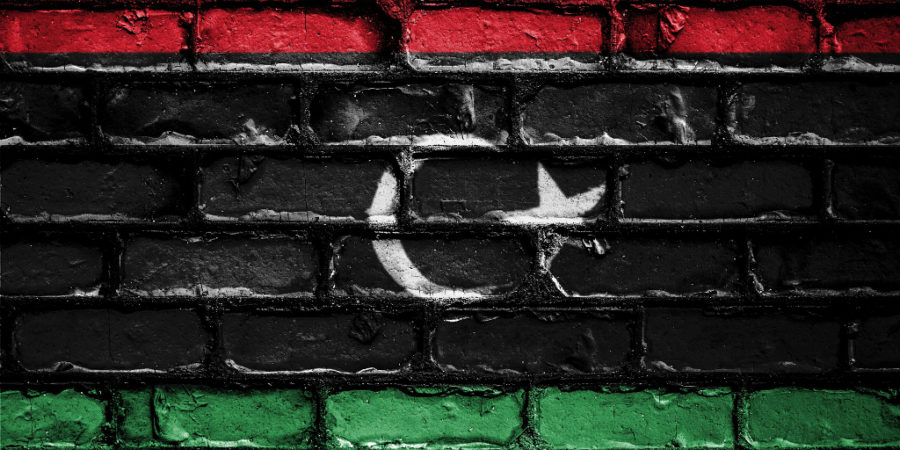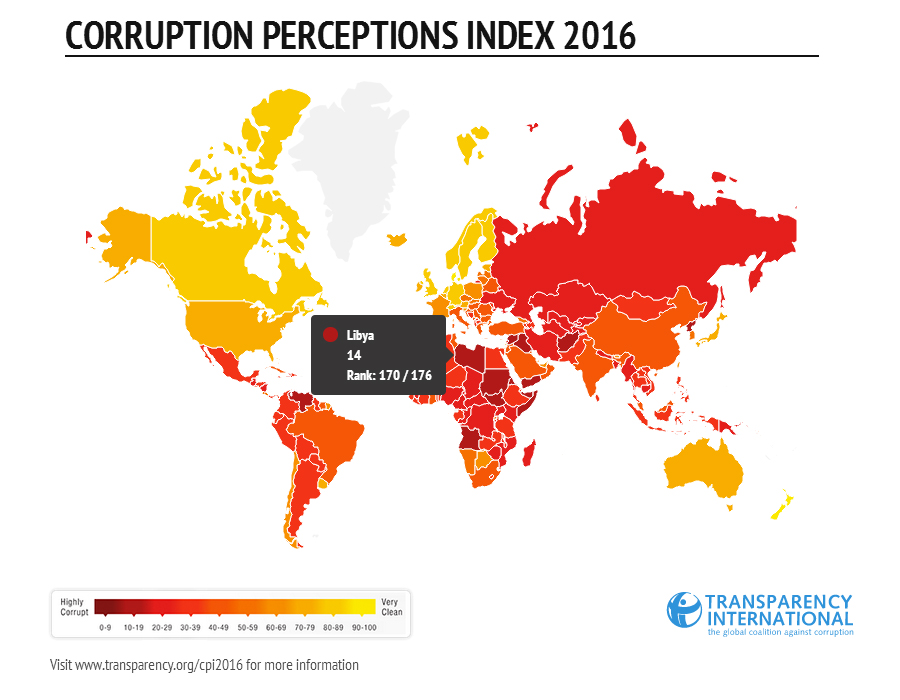8th November 2017 Tripoli, Libya
Corruption, Crime and Complacency

Corruption is the scourge of countries trying to lift themselves out of poverty. Around the world, politicians and officials are putting their hands in the till and stealing their country’s wealth. Their actions benefit narrow, powerful elites by allowing them to cream off cash and benefits and favour their friends, family and fellow felons.
Their actions deprive the majority of citizens of the chance to share their nation’s wealth and rise out of poverty. Corruption holds back improvements in education, healthcare and sanitation. It holds back investment that can create jobs. And it holds back the development of institutions in which the voice of the people can thrive.
Libya was rated 170th out of 175 countries in Transparency International’s Corruption Perceptions Index for 2016. The index shows that corruption is systematic in many countries, not just Libya.
Putting the scores in context, the report states: “The lower-ranked countries in our index are plagued by untrustworthy and badly functioning public institutions like the police and judiciary. Even where anti-corruption laws are on the books, in practice they are often skirted or ignored. People frequently face situations of bribery and extortion, rely on basic services that have been undermined by the misappropriation of funds and confront official indifference when seeking redress from authorities that are on the take.”
How much of this applies in Libya in practice? It is difficult to measure. But the National Audit Bureau’s 2016 report stated that it was widespread in all parts of the country.
The NAB went on to highlight banking, abuse of letters of credit, misuse of debit/credit cards and certified cheques and transfers from government accounts to private accounts. All these factors limit growth. The World Bank’s Ease of Doing Business index rates Libya 185th out of 190 countries.
Criminality is also a major problem. One of the best-known scams is the smuggling of subsidised fuel. Libyans enjoy the cheapest petrol in the world thanks to subsidies worth LYD 4.3 billion so far this year. But much of this fuel is taken out of the country by boat and truck and sold for a profit elsewhere. This means that a large part of Libya’s budget for subsidies is being spent for the benefit of organised criminals.
Complacency is also part of this grim economic picture. In recent months, Libyans have suffered from electricity blackouts and water shortages. In the energy sector, generating capacity falls far below demand. So when it is hot in the middle of summer, or cold during winter, the grid can’t cope with the demand.
Similarly, on water supply: Libya has no permanent rivers and depends on the Great Man-Made River and desalination. Much of the network is dilapidated and leaking. Again, demand is higher than supply.
A lot of electricity and water is wasted. So, as in other countries, customers could be urged to be more efficient: to switch off their air-conditioning when they go away, to adjust thermostats to a comfortable but not excessive temperature, not to hose down the pavement outside their houses.
The answer to these problems is good governance, transparency and accountability: a strong government and institutions that can tackle these problems and provide people with the quality services they deserve; audit reports, independent media investigations and open debates that expose corrupt practices and individuals; and an electoral system that allows those accused of corruption to be held to account and, if accusations are proven, kicked out of office.
Libya has the potential to return to being a stable, wealthy country with security, education and healthcare for all. But the economy is facing a major crisis. Tackling corruption, crime and complacency has to be part of any future government’s vision and programme.
The question is how and where to find an approprite strong Government can tackle all these plagues . As long as weapons are in the wrong hands and it is very hard to rule such country.
The big players (USA ,UK, France and Italy) can if they want seriously solve the problem.
Thank you Mr Ambassador for addressing this important issue one of the major problems of the country is security ,the absence of professional security apparatus allowed for the drainage of every thing from tapping on the man made river pipes to unauthorized electrical connections, speaking of my self and every family I know no electrical bills have been received ever since 2011 that prompts to leave appliances operating even when no body at the residence.
There are good people at the judiciary and the audit offices as there are corrupt but for the good to overwhelm the bad some sense of security must be felt.
The audit offices and the CBL in order to be seen to be doing some good they are targeting the few organizations that try to work as should be,speaking from personal experience as a technical manager of an aviation organization it took us nearly 6 months to pay less than 60k pounds to a UK bona fide service provider that supplied us some spares some 4 years ago,we have been allocated a budget but we are unable to transfer any amount to prominent service providers which don’t engage in any corruption thus leaving our aircraft to rust at the premises of our contracted maintenance organization’s facilities depriving the government of aircraft that were used in the past to transport top government officials thus allowing for opportunists to take advantage of sky rocketing aircraft lease .
As regards the smuggling of goods and fuel subsidies must immediately end, but that needs a strong government to carry out such a measure.
With the stalemate of the political process many people think the only solution is to have the country put under UN trusteeship until the country has established strong security and institutions then carry out elections parliamentary and presidential governed by an interim institution designed to serve the current purpose.
Mr Millet
Absolute direct comment. I do not know this type of disease became prevalent. Once upon a time these phenomenae are almost unrecordable. Nowadays they are the rather than the exception.
The solution is far from near.